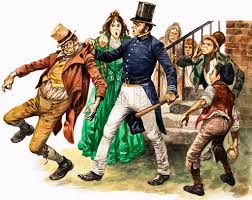 Around 1829, Sir Robert Peel and others put together a set of policing principles for the London Metropolitan Police — they’re still important today!
Around 1829, Sir Robert Peel and others put together a set of policing principles for the London Metropolitan Police — they’re still important today!
The Principles were designed to separate the function of policing away from the military and private security. They are as important today as they were over 185 years ago.
For purposes of clarity and understanding, I have translated the Principles into modern language.
Peel’s Nine Principles of Policing (1829)
(A Modern Translation)
-
- The basic mission of police in a free society is to prevent crime and serve as an alternative to military force and repression.
- The ability of police to fulfill their mission is dependent upon community approval and respect.
- Police must secure the willing compliance of the community and their voluntary observance of the law.
- Cooperation from the community is inversely related to the amount of force police use to accomplish their mission.
- Police must be impartial, service-oriented, courteous, friendly to all community members, and willing to sacrifice themselves in the protection and preservation of life.
- Physical force is to be used only when persuasion, advice, and warnings are insufficient.
- Police are to be recruited from the community and the community is, in fact, the police. Both police and community members are responsible for the welfare of the community.
- Police are not to judge, convict nor punish; that is the role of the judiciary only.
- The effectiveness of police is to be measured by the absence of crime and disorder in the community, not by their activities and actions.
 Find out more about Robert Peel HERE.
Find out more about Robert Peel HERE.


I would modify as follows:
1. The mission of the police is to ensure a safe environment in which all parts of government collaborate in pursuit of justice in all its forms.
4. Community cooperation is dependent on the perception that police use of coercive power is just.
5. The police must police (it’s an under used verb) impartially, treat all with respect, and be willing to sacrifice themselves in the protection and preservation of the lives of innocent citizens.
6. The police shall use the least coercive form of power necessary to achieve legitimate government objectives.
7. Only the most cognitively, physically, and morally fit citizens should be entrusted with police powers.
9. The effectiveness of a government is to be measured by the extent to which that government achieves justice in all its forms. Policing is but one function that contributes to that end.
LikeLike
Thanks, Mark, I like this.
LikeLike